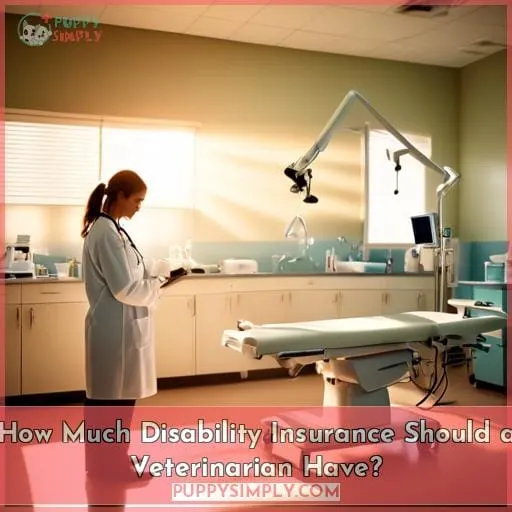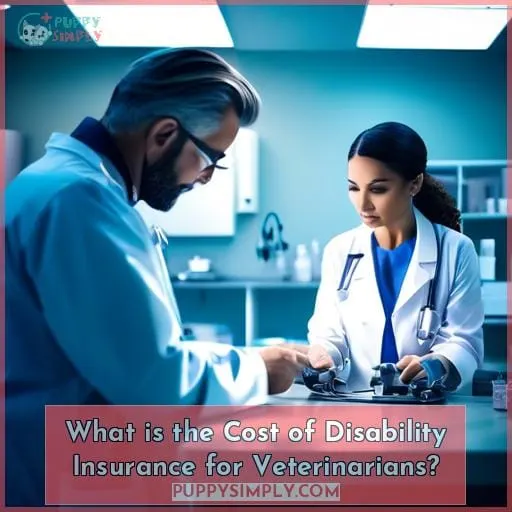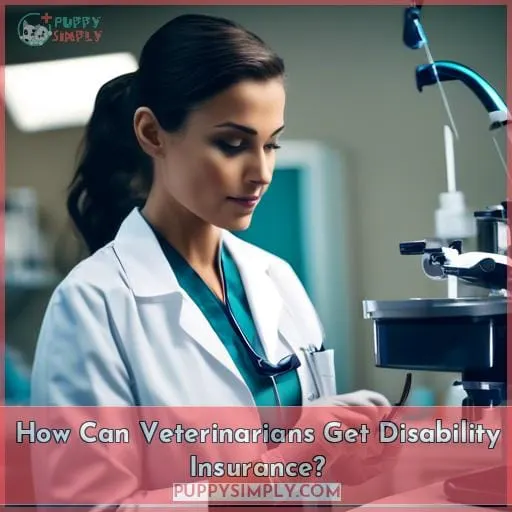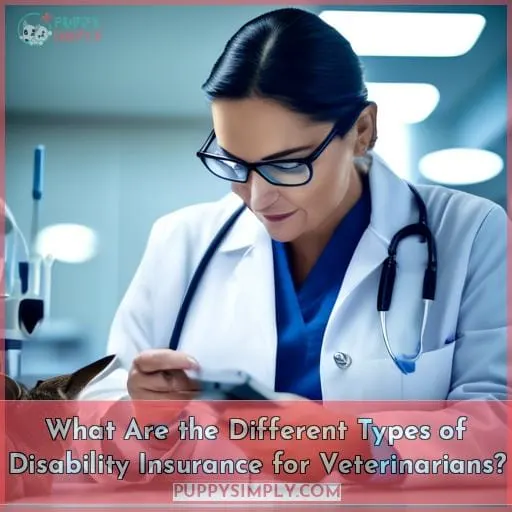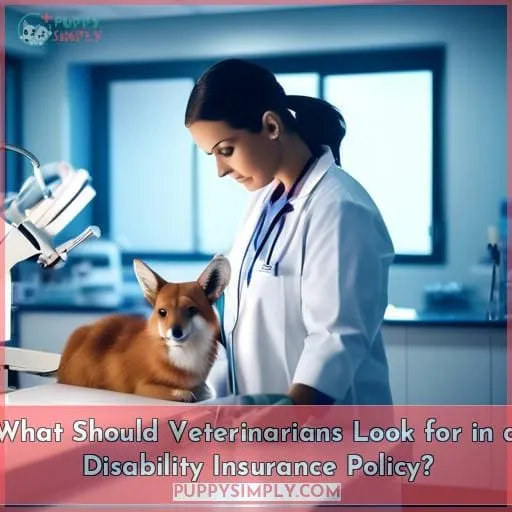This site is supported by our readers. We may earn a commission, at no cost to you, if you purchase through links.
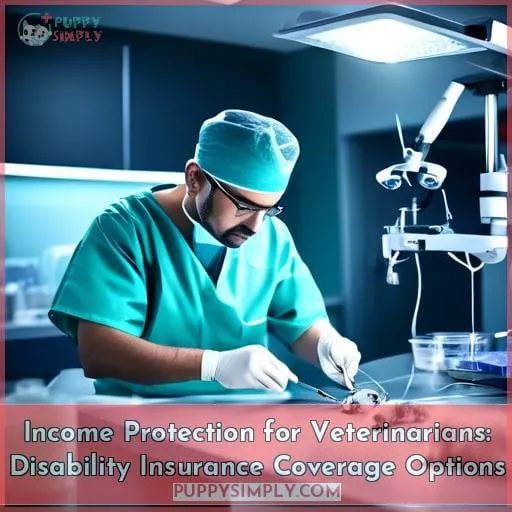 The unpredictable hand of fate could deal you a serious illness or injury, leaving you unable to earn a living.
The unpredictable hand of fate could deal you a serious illness or injury, leaving you unable to earn a living.
Disability insurance for veterinarians acts as a financial safety net, catching you before you hit rock bottom.
With disability insurance, you can rest easier knowing that your income is protected if the worst happens and you can’t work.
Don’t let an unexpected disability derail your financial security—safeguard your livelihood with disability insurance.
Table Of Contents
- Key Takeaways
- Why Do Vets Need Disability Insurance?
- What Are the Benefits of Disability Insurance for Veterinarians?
- How Much Disability Insurance Should a Veterinarian Have?
- What is the Cost of Disability Insurance for Veterinarians?
- How Can Veterinarians Get Disability Insurance?
- What Are the Best Disability Insurance Companies for Veterinarians?
- What Are the Different Types of Disability Insurance for Veterinarians?
- What Should Veterinarians Look for in a Disability Insurance Policy?
- When Should Veterinarians Purchase Disability Insurance?
- Frequently Asked Questions (FAQs)
- What are the tax implications of disability insurance benefits for veterinarians?
- Are there any discounts or incentives available for veterinarians who purchase disability insurance early in their careers?
- How does disability insurance coverage for veterinarians compare to coverage for other professionals?
- Are there any special considerations for veterinarians who work in rural or underserved areas when it comes to disability insurance?
- What are the potential consequences for veterinarians who do not have disability insurance?
- Conclusion
Key Takeaways
- Disability insurance safeguards veterinarians’ income during illness or injury that prevents work, acting as a financial safety net to maintain lifestyle and earning capacity.
- Benefits include income protection, tailored coverage options, peace of mind, financial security, and tax-free income in case of disability.
- Coverage options include own-occupation coverage, future increase options, partial/residual disability coverage, non-cancellable provisions, and workplace hazard coverage.
- Veterinarians can obtain disability insurance through employer-provided plans, professional associations, and independent insurance agents.
Why Do Vets Need Disability Insurance?
As a vet, you need disability insurance to safeguard your income if illness or injury prevents you from working.
It’s your financial safety net, ensuring you can maintain your lifestyle if the unexpected strikes.
Disability insurance protects your ability to earn a living, something you’ve worked hard to build.
It provides peace of mind, knowing that if you become disabled, you’ll have a financial cushion to fall back on.
Veterinary medicine is a demanding profession, both physically and mentally.
You face unique workplace hazards, from animal bites and scratches to exposure to infectious diseases.
Any injury or illness can potentially sideline you, jeopardizing your livelihood.
Disability insurance gives you the confidence to face these risks, knowing you’ll be financially secure if the worst happens.
What Are the Benefits of Disability Insurance for Veterinarians?
Disability insurance can protect your income if you’re unable to work due to illness or injury.
It can also offer coverage options that suit your specific needs.
Given the physical demands and potential hazards of your job, disability insurance can provide peace of mind and financial security.
Protection of Income
Gough, Gough, Gough.
Disability insurance acts as a safety net for your income if an illness or injury silences your stethoscope.
You’ve invested a lot in your veterinary career, and disability insurance safeguards your hard-earned income.
- It protects against financial devastation if an unexpected disability strikes.
- It offers tax-free income if you can’t work due to a covered disability.
- It ensures your student loans are covered if you become disabled.
- It provides peace of mind, knowing you’re financially protected if you can’t work.
Coverage Options
Your disability insurance coverage options include:
- Own-occupation coverage: Ensures you receive benefits if you can’t work in your specialty.
- Future increase option: Allows you to increase your benefit amount in the future without a medical exam.
- Partial/residual disability coverage: Provides benefits if you can work part-time but not full-time.
- Non-cancelable provision: Guarantees that your policy can’t be canceled by the insurance company.
Workplace Hazards
- Use synonyms.
How Much Disability Insurance Should a Veterinarian Have?
To adjust premiums for your disability insurance:
- Extend your waiting period.
- Make changes to policy riders.
Policy riders can include:
- Own-occupation coverage.
- Future increase options.
- Partial/residual disability coverage.
- Non-cancelable provisions.
Work with an independent insurance agent to create a policy that meets your needs and your budget.
Adjust Premiums
To adjust your premiums, you can:
- Extend the waiting period: The longer you’re willing to wait before benefits kick in, the lower your premium will be.
- Add a future increase option: This rider allows you to increase your coverage amount in the future without having to go through underwriting again.
- Get a non-cancellable policy: This type of policy guarantees that your coverage can’t be canceled by the insurance company, even if you develop a health condition.
Policy Riders
The addition of policy riders can further tailor your disability insurance policy to meet your specific needs and budget.
Consider:
- An own-occupation rider, ensuring benefits even if you can work in another field.
- A future increase rider, allowing you to increase your benefit amount in the future without medical underwriting.
- Partial coverage, providing benefits for a percentage of your disability.
- Non-cancelable riders, guaranteeing your policy can’t be canceled by the insurance company.
What is the Cost of Disability Insurance for Veterinarians?
How much you pay for disability insurance as a veterinarian depends on several factors:
- Age
- Gender
- Specialty
- Risk classification
- Amount of coverage
- Riders added to your policy
For instance, a 30-year-old female small animal veterinarian with no health problems might pay around $1,000 per year for a disability insurance policy that provides $5,000 per month in benefits.
However, a 50-year-old male large animal veterinarian with a history of back problems might pay closer to $2,500 per year for the same coverage.
The cost of disability insurance can also be affected by the type of policy you choose:
- Short-term disability insurance provides benefits for a limited time, typically six months to two years.
- Long-term disability insurance provides benefits for a longer period, typically until you reach retirement age.
Long-term disability insurance is generally more expensive than short-term disability insurance.
Riders can also increase the cost of your disability insurance policy. Riders are optional add-ons that can provide additional coverage, such as coverage for student loan payments or a cost-of-living adjustment.
Despite the cost, disability insurance is a smart investment for veterinarians. It can provide you with peace of mind knowing that you’ll be financially protected if you’re unable to work due to illness or injury.
How Can Veterinarians Get Disability Insurance?
You can get disability insurance through your employer, a professional association, or an independent insurance agent.
Employer-provided plans often have limited benefits, while association plans may be costly. Independent agents can help you find a policy that meets your specific needs and budget.
Employer-Provided Plans:
- Check with your employer to see if they offer disability insurance as part of their benefits package.
- If so, carefully review the terms and conditions to ensure the coverage is adequate.
Professional Associations:
- Some professional associations, like the AVMA, offer group disability insurance plans to their members.
- These plans may offer competitive rates and benefits, but be sure to compare them to individual policies to find the best coverage for you.
Independent Insurance Agents:
- Working with an independent insurance agent is a great way to find a disability insurance policy that meets your specific needs and budget.
- Independent agents can compare policies from multiple companies and help you choose the one that’s right for you.
What Are the Best Disability Insurance Companies for Veterinarians?
As a veterinarian, you should explore disability insurance companies that specialize in your profession.
They often offer competitive rates for small animal vets and may provide a student loan protection rider to help you manage your debt in case of disability.
Research and compare policies to find the best coverage for your needs and budget.
Small Animal Vets Rates
Now that you know where to purchase disability insurance, let’s compare the rates offered by different companies specializing in insuring small animal vets.
Research thoroughly to find the best rates for your specific plans.
Some companies offer group discounts for veterinarians employed by the same employer.
Consider your risk classification and long-term planning goals when comparing rates.
The right disability insurance policy can provide you with the financial protection you need to maintain your lifestyle and peace of mind.
Student Loan Protection Rider
Gough’s article emphasizes the significance of a student loan protection rider for veterinarians.
This rider ensures that your student loan payments are covered if disability strikes, preventing a potential financial burden.
You can choose from various benefit period options and premium discounts to customize your coverage.
Don’t let student loans hinder your ability to secure a veterinarian’s safety net.
What Are the Different Types of Disability Insurance for Veterinarians?
Veterinarians, explore your options to find the disability insurance that best suits your needs.
Individual disability insurance offers tailored coverage, including a choice of benefit amounts, waiting periods, and riders.
Group disability insurance, often provided by employers or professional associations, offers convenience and potential cost savings.
Employer-provided disability insurance may be a benefit of your employment, while association disability insurance is available through professional organizations.
Supplemental disability insurance can enhance your existing coverage or provide additional protection if your employer-provided or association policy is limited.
No matter your choice, disability insurance can safeguard your income and provide peace of mind, ensuring you can continue to care for your patients and your family in the face of unexpected illness or injury.
Contact us today to learn more about your options and secure the protection you deserve.
What Should Veterinarians Look for in a Disability Insurance Policy?
When looking for a disability insurance policy, you should zero in on the details that matter most:
- The definition of disability
- The benefit period
- The elimination period
A solid policy should clearly define disability and include a broad range of conditions that would qualify you for benefits.
Look for a policy with a benefit period that lasts until you reach retirement age or can reasonably return to work.
Lastly, consider the elimination period – the time between the onset of disability and when benefits begin.
Don’t forget to compare policy conditions, premium rates, and guarantee options.
Read the fine print to understand any limitations or exclusions.
Look for coverage add-ons that can enhance your protection, such as a partial disability benefit or a future increase option.
Finally, inquire about the claim procedure to ensure it’s straightforward and hassle-free.
When Should Veterinarians Purchase Disability Insurance?
As a veterinarian, you should purchase disability insurance early in your career while you’re healthy and insurable.
The younger and healthier you are, the lower your premiums will be.
Don’t wait until you’re sick or injured to buy disability insurance. By then, it may be too late or too expensive.
Consider purchasing disability insurance even if you’re going to an internship/residency or corporate practice.
Discuss disability insurance with your partner if you’re considering becoming one or purchasing/starting a practice together.
Lastly, consider purchasing long-term care insurance, dental vision, and eye health insurance to protect your overall health and well-being.
Don’t forget to upload pet images and add captions on Vet School Meme-ories for a chance to win prizes.
Frequently Asked Questions (FAQs)
What are the tax implications of disability insurance benefits for veterinarians?
Disability insurance benefits for veterinarians may be taxable.
The taxability depends on the type of policy and the source of the premiums.
Consult a tax professional for personalized advice.
Are there any discounts or incentives available for veterinarians who purchase disability insurance early in their careers?
Did you know that nearly 40% of veterinarians will experience a disability lasting five or more years?
Protect your earning potential early on.
Ask about discounts for new grads.
How does disability insurance coverage for veterinarians compare to coverage for other professionals?
Veterinary disability insurance coverage is tailored to the unique risks and earning potential of veterinarians.
It ensures income protection in case of illness or injury.
It’s designed to safeguard your financial stability and livelihood.
Are there any special considerations for veterinarians who work in rural or underserved areas when it comes to disability insurance?
Veterinarians in rural or underserved areas face unique challenges.
Consider broader coverage options, including policies with extended waiting periods or higher benefit amounts.
Ensure adequate protection against income loss due to disability.
What are the potential consequences for veterinarians who do not have disability insurance?
Without disability insurance, you risk losing income if illness or injury prevents you from working as a veterinarian.
This could lead to financial hardship for you and your family.
Conclusion
Imagine yourself, a diligent veterinarian, suddenly struck by an unforeseen illness that prevents you from performing surgeries or treating animals.
Your income, the lifeblood of your livelihood, grinds to a halt.
But you have a safety net: disability insurance for veterinarians.
It’s a lifeline that keeps your finances afloat during stormy times.
Secure your financial well-being with disability insurance—a wise investment in peace of mind.



